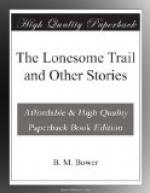Weary looked down upon him and smiled indulgence of the tone. “If you aren’t busy right now, I’ll start in and tell yuh. Yuh better sit down on that bucket whilst I’m doing it—if I’m thorough it’ll take time.”
“Humph!” said the man again and carefully pared the end of a fat, black cigar. “You seem to think you know it all. What’s your trade?”
“Punching cows—in Northern Montana,” answered Weary, mildly.
The man took the trouble to look at him again, this time more critically—and more favorably, perhaps. “Bronco-buster?” he demanded, briefly.
“Some,” grinned Weary, his thoughts whirling back to the dust and uproar in the Flying U corrals—and to Glory.
The man seemed to read what was in his eyes. “You ought to know better than to founder a three-hundred-dollar trotter, then,” he remarked, with some of the growl smoothed out of his voice.
“I sure had,” agreed Weary, sympathetically.
“That’s why I fired that four-or-five-kinds-of idiot just now,” confided the other, rising to the sympathy in Weary’s tone. “I need men that know a little something about horses—the foreman can’t always be at a man’s elbow. You can start right in—pay’s good. Go tell the foreman I’ve hired you; that’s him back there in the office.”
Then came the rain. Week after week of drab clouds and drizzle, and no sun to hearten a man for his work. Week after week of bobbing umbrellas, muddy crossings, sloppy pavements and dripping eaves—and a cold that chilled the marrow in his bones.
Weary, after a week of poking along in the rain of an evening when his work was done, threw up his hands, figuratively, and bought him an umbrella, hoping devoutly they would never get to hear of it in Dry Lake. He stood for two minutes in the deep doorway of the store before he found nerve to open the awkward thing, and when he did so he glanced sheepishly around him as if it were a weak thing to do and a disgraceful.
Fog and rain and mud and mist, day after day through long months. Feeding hungry horses their breakfast at five o’clock in the morning; brushing, currying, combing till they shone satin-smooth. Harnessing, unharnessing; washing mud from rigs that would be splashed and plastered again before night. Driving to houses that were known by the number over the door, giving the reins over to somebody and walking back in the rain. Piling mangers with hay, strewing the stalls deep with straw. Patting this horse as he passed, commanding the next to move over, stopping to whisper caressing words into the ear of a favorite. Sitting listlessly in the balcony of some theatre in the evening while a mimic world lived its joys and sorrows below and an orchestra played soft accompaniment to his vagrant thoughts. All this was Weary’s life in Portland.
Not exactly hilarious, that life. Not a homelike one to a man fresh from eating, sleeping, working, reveling with fellows who would cheerfully give him the coat upon their straight backs if he needed it; fight for him, laugh at him, or laugh with him, tease him, bully him, love him like a brother—in short, fresh from Jim Whitmore’s Happy Family.




